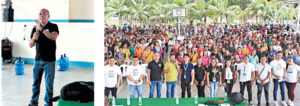Public utility services are fundamental to modern society. While access to them is often taken for granted, power, water, transportation, and other utilities are crucial for maintaining public health, safety, and economic stability. However, with the rising price of goods due to inflation, disparities in access to these essential services exist, particularly in rural and underserved urban areas.
Data from Australia-based consulting firm International Energy Consultants (IEC) indicates that while power rates in the Philippines are fair and reasonable, there is still room for improvement after the country’s average tariff ranked 21st out of 46 energy markets globally and only 3% below the global average.
In an effort to make power more accessible and affordable to these sectors, President Ferdinand R. Marcos, Jr. launched the Lifeline Rate Program in August last year. The program, implemented by the Energy Regulatory Commission (ERC), Department of Energy (DoE), and Department of Social Welfare and Development (DSWD), aims to subsidize low-income households who are unable to pay their electricity bills at full cost.
Beneficiaries of the “4Ps Act” (Pantawid Pamilyang Pilipino Program) under Republic Act No. 11310, or customers living below the poverty line set by the Philippine Statistics Authority, are qualified to avail of discounted rates for their power bills.
According to the ERC’s current guidelines, qualified beneficiaries must maintain their monthly electricity usage below the 100-kWh threshold. This limitation is crucial to ensure that the program targets households that are genuinely in need and promotes energy conservation among users.
To apply for the program, eligible individuals may prove their qualifications by submitting to their Distribution Utility (DU) or Electric Cooperative (EC) a certification from the local Social Welfare and Development Office (SWDO) issued in the past six months showing that their family income is below the poverty threshold or, for 4Ps members, be included in the DSWD’s Certified List of 4Ps Beneficiaries provided by the ERC.
Lifeline Rate Program information dissemination and registration in Zamboanga City
Additionally, applicants for the discounted power rates have to provide a duly accomplished Lifeline Rate Application Form, their most recent electricity bill, and any valid government-issued identification card (ID) containing the signature and address of the customer.
Each qualified household can receive the lifeline rate from only one DU or EC service. In case multiple beneficiaries from the same household apply for the lifeline rate, only one application will be approved to ensure that more households in need can receive assistance.
The discounts on power rates for eligible beneficiaries vary depending on the prevailing rates of their DUs or ECs, as well as their monthly electricity consumption.
For qualified individuals with zero to 20 kWh of monthly household power consumption living in the Meralco franchise area, a 100% discount is applied on generation charges, including system loss, transmission, and distribution components of their bill. However, they are still required to pay a fixed metering charge of P5 which results to a significantly reduced total payable amount of around only P20 from their overall electric bill compared to more or less P250 if they had not availed themselves of the Lifeline Rate.
Similarly, customers with a monthly usage of 21 kWh-50 kWh who apply for the Lifeline Rate will pay approximately P300 on their electric bills. Without the program, these customers would face an undiscounted bill of around P550.
Meanwhile, eligible beneficiaries consuming 51 kWh-70 kWh per month who apply for the Lifeline Rate will pay around P522.90, compared to the undiscounted rate of P763.37. For those consuming 71 kWh-100 kWh, the program reduces their bill to approximately P904.21, instead of the standard P1,099.10. This substantial reduction ensures that electricity remains affordable for households with limited income, providing critical financial relief and support.
Despite these benefits, only 191,399 households out of the 4.2 million 4Ps beneficiaries have registered for the Lifeline Rate discount as of Dec. 15 according to DoE Electric Power Industry Management Bureau Director Luningning Baltazar.
She attributes this low number of registrants to the lack of dedicated meters for qualified individuals and the practice of several households sharing power meters, making consumption by eligible users difficult to track. While Ms. Baltazar said that they would be looking into addressing the issue, she still encouraged 4Ps beneficiaries to register as they are still studying the question of what would be the appropriate threshold.
Information campaign on the Lifeline Rate Program in Malaybalay City, Bukidnon
To motivate eligible individuals to apply for the program, the DoE, ERC, and DSWD have continued the information dissemination effort in partnership with the local government units.
Most recently, last April, 560 from Tagum City, Davao Del Norte; 750 from Davao City; 266 from Butuan City, Agusan del Norte; 196 attendees from Bayugan City, Agusan del Sur; 380 from Claver, Surigao del Norte; and 411 from Lebak, Sultan Kudarat participated in the information and education campaign and registration drives through encouragement by the local SWDO units, 4Ps Provincial Links, and their DUs and ECs.
By making electricity more accessible through discounted rates, the Lifeline Rate program not only alleviates the economic burden on vulnerable households but also shows the commitment of the government to improving the quality of life for all Filipinos. With the persistent effort shown by government agencies in implementing the program, more and more Filipinos are empowered to enjoy a basic necessity essential for daily living without facing undue financial hardship. — Jomarc Angelo M. Corpuz
